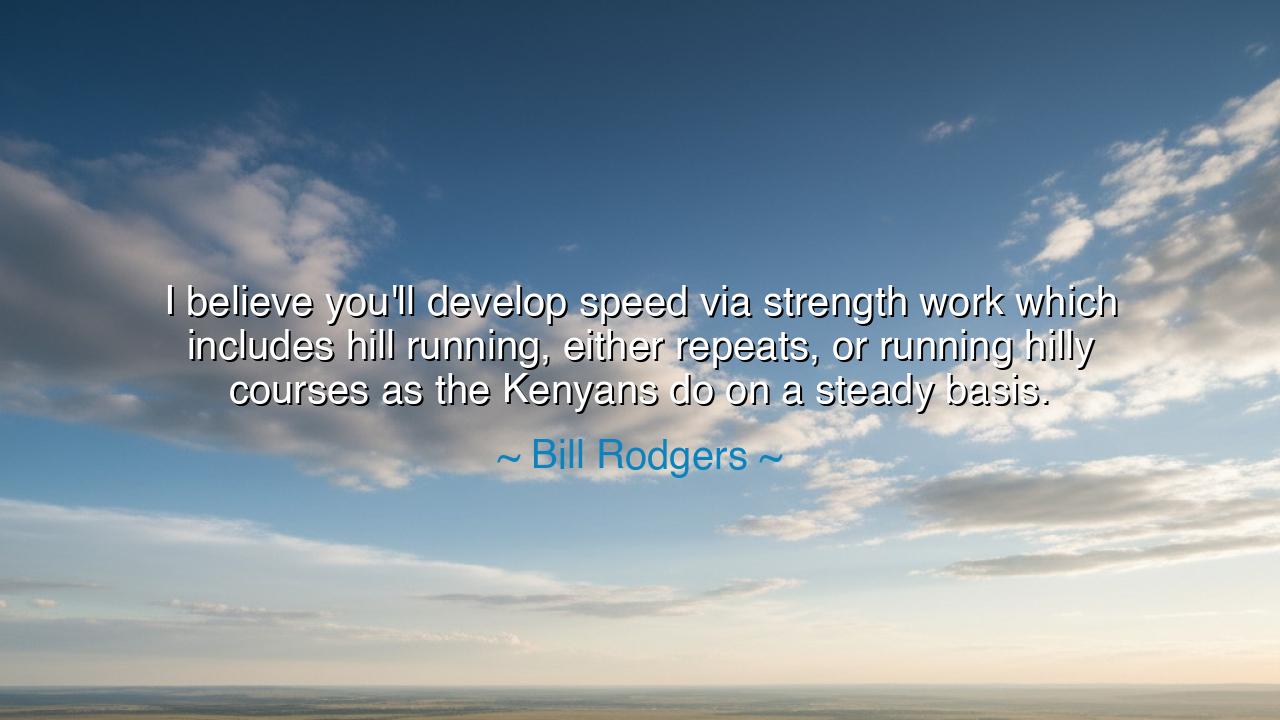
I believe you'll develop speed via strength work which includes
I believe you'll develop speed via strength work which includes hill running, either repeats, or running hilly courses as the Kenyans do on a steady basis.






The words of Bill Rodgers, the great marathoner, come to us like counsel from one who has walked the long and punishing road: “I believe you’ll develop speed via strength work which includes hill running, either repeats, or running hilly courses as the Kenyans do on a steady basis.” In this teaching lies a truth not only for the runner, but for all who seek greatness in life—that true speed is born not from light steps alone, but from the hidden labor of strength.
For many desire swiftness—the ability to surge forward, to conquer quickly, to excel before the eyes of men. But Rodgers reminds us that speed is not a gift dropped from heaven, nor the fruit of effortless effort. It is the product of struggle, of labor in the unseen places, of training against resistance. The hills symbolize this truth. They are not smooth paths; they rise steeply, testing the lungs, burning the legs, humbling the spirit. Yet it is on these very slopes that the runner’s true strength is forged, and from that strength, speed is born.
The Kenyans, whose dominance in distance running is legendary, embody this principle. They do not chase speed on flat tracks alone; they embrace the endless hills of their homeland, where each climb is both torment and teacher. From these hills emerges their unmatched endurance, their ability to surge at the finish when others falter. What appears as natural talent is in truth the fruit of discipline, of daily battle against gravity itself. The hill running Rodgers praises is not only a physical training, but a metaphor for life: by facing resistance steadily, greatness emerges.
History too mirrors this lesson. Consider Hannibal’s army, which crossed the Alps with elephants and soldiers, scaling mountains that seemed impassable. Though many perished, those who endured were hardened by the climb, and they descended into Italy with the strength of men who had conquered nature itself. Their might in battle was not simply in numbers, but in the discipline of those who had endured the hardest of trials. Likewise, the runner who endures the hills emerges with a spirit that no flat course can defeat.
Rodgers’ wisdom is also a warning against shortcuts. Too often, we seek results without the labor that produces them. We wish for speed without training, reward without struggle, triumph without sacrifice. But the truth is eternal: only through resistance is true power born. The hills we dread are the very forges of our destiny. To avoid them is to remain weak; to embrace them is to discover the hidden wells of our strength.
The lesson for us is clear: in whatever field you strive—whether running, learning, building, or leading—seek not only the smooth path but also the hard road. Do not fear the hills, for they are your teachers. Do not despise the burn of labor, for it is the fire that makes you strong. Remember that speed without strength is fleeting, but speed born of strength endures, carrying you not only to victory but to mastery.
Practical action lies before you. If you are a runner, embrace hill running as Rodgers counsels. If you are not, find the “hills” in your own life—the tasks that seem hardest, the resistances you avoid—and face them steadily. Repeat them, endure them, climb them again and again. Over time, you will find that they no longer weaken you, but empower you. Your spirit will grow light, your steps swift, your soul unshaken.
So let Bill Rodgers’ words endure as counsel for all who chase excellence: true speed is born of strength, and true strength is forged in resistance. Climb the hills, embrace the hardship, endure the fire—and you shall find that when the world calls upon you to run, you will not only endure, but fly.






AAdministratorAdministrator
Welcome, honored guests. Please leave a comment, we will respond soon